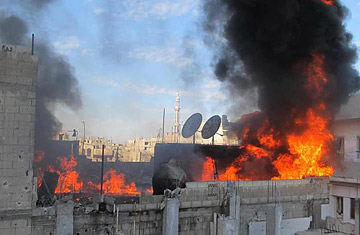
In a handout picture released by a Syrian opposition group on Feb. 22, 2012, fire rises from the roof of a building in the Bab Amr neighborhood of Homs, allegedly during a bombardment of the Syrian city
U.N. investigators have rushed out a report in Geneva alleging there is "credible and consistent evidence" that top Syrian officials — including perhaps President Bashar Assad — had ordered soldiers to kill protesters and to use machine guns and tanks to staunch the uprising in civilian neighborhoods. On Wednesday, a mortar attack in the besieged Bab Amr neighborhood of Homs killed the celebrated American correspondent Marie Colvin and French photographer Rémi Ochlik as well as the Syrian citizen-journalist Rami al-Sayed. Several Western reporters remain trapped in Bab Amr, including Edith Bouvier of Le Figaro, who is injured in the leg, and William Daniels, a French photographer on assignment for TIME.
The report, which investigators are due to be presented to the U.N. Human Rights Commission next week, is clearly aimed at preparing indictments for the International Criminal Court, or ICC, in the Hague. It accuses security officials directly accountable to Assad of "crimes against humanity and other gross human rights violations." That mirrors the legal language used in ICC indictments last year against Libya's Muammar Gaddafi and his son Saif al-Islam. The directives from the Syrian regime, U.N. officials said, included "kill soldiers who refused to obey such orders."
Colvin and Ochlik's deaths have raised the heat in the Syria debate, with British Prime Minister David Cameron expressing his shock in Parliament on Wednesday and a visibly shaken French President Nicolas Sarkozy telling reporters in Paris, "This is enough. This regime must go." Hundreds of people reportedly poured into the streets of Homs after dark on Wednesday night, holding posters of Colvin and Ochlik above the words, in English, "We Will Never Forget You."
As the shock spread over the journalists' deaths, there were signs that Russia, one of Assad's closest allies, was finally searching for a way to ease the conflict. Russian President Dmitri Medvedev telephoned Saudi King Abdullah on Wednesday to discuss how to calm the mounting crisis, according to the Saudi Press Agency. Russia vetoed a U.N. resolution this month condemning the violence in Syria and has refused to attend an emergency meeting in Tunis on Friday, in which representatives from about 70 countries will be gathering to coordinate action. The Saudi King declined to discuss strategy on Syria with the Russian President, according to the Saudi reports, which quoted him as saying that Russia "should have coordinated with the Arabs" before vetoing the U.N. resolution. Now, the King was also quoted as saying that "dialogue about what is happening is futile."
Hours later, Russian diplomats in the region appeared to support daily two-hour cease-fires, an idea that the International Committee of the Red Cross has argued for as a way to get emergency supplies into the area and to transport injured people to medical facilities outside the war zone.
Yet for all the dismay over Wednesday's attack, there are few signs that it will tip Western leaders into supporting a Libya-style military intervention in the Syrian conflict, which began in March and in which about 6,000 people are believed to have been killed so far. Libya's NATO campaign, which the U.N. authorized last March, was aimed at rescuing civilians in Benghazi from all-out slaughter by Gaddafi's military — a situation actually being inflicted upon the civilians in the besieged area of Homs, where about 28,000 people have been encircled by Assad forces since Feb. 4. On Thursday, Syrian army tanks were reportedly ordered into the area.
Despite the similarities with Libya, Western officials have made clear they are hunting for nonmilitary options. For one thing, a military campaign would likely be unpopular at a time U.S. President Barack Obama and French President Sarkozy — who were key to the Libya campaign — are facing re-election. British Foreign Minister William Hague, who pushed strongly for last year's NATO bombing in Libya, told BBC Radio on Thursday that the killings in Syria would need to be "on a vastly greater scale" than Libya in order to warrant military intervention. That is because the West's military intervention could spiral into a broader war in an already unstable region, engulfing neighboring Israel and Iran and triggering a mass exodus of Syrians across the borders.
In addition, two factors make a military intervention intensely difficult to argue before the U.N. Unlike in Libya, Russia's support of Assad has until now seemed solid. And unlike the Libyan rebels last year, several Syrian opposition figures say they oppose Western military intervention.
The U.S., European and Arab diplomats converging on Tunis for Friday's meetings are instead focused on tightening Western sanctions and increasing their support for opposition groups — including trying to help those outside Syria coordinate with activists on the ground. "We will do everything we can to avoid a Libya-style intervention," Syrian National Council executive member Bassma Kodmani told TIME in an interview in Paris on Tuesday. "We aren't talking about regime change," she said, referring to Western bombing. "We're talking about Syrians themselves achieving the removal of the regime." Now the question is, how many more will die before that occurs.
